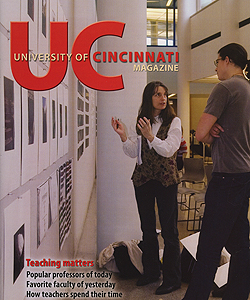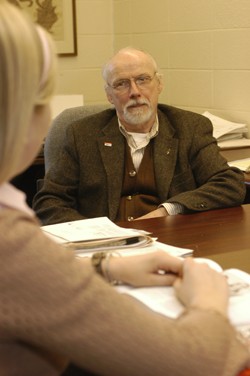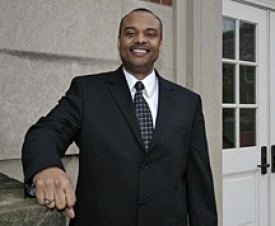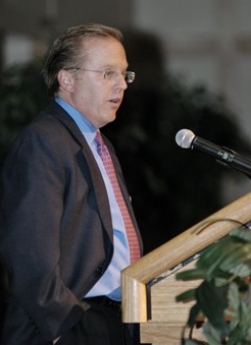Three University of Cincinnati professors offer their opinions on the tenure debate, 'good teaching' and common myths about the academy.
(February 2007)
 February 2007
February 2007
Teaching Matters
Popular professors of today and favorite faculty from yesterday.
 Issue Archive
Issue ArchiveBrowse our archive of UC Magazine past issues.
(February 2007)
Skeptics have raised important questions about faculty tenure. Why should tenured professors have greater job security than other employees? Doesn't tenure protect unproductive senior faculty, highly paid deadwood? How can universities with numerous tenured professors wedded to traditional disciplines make room for new faculty in emerging fields?

Professor Howard Tolley. Photo/Andrew Higley
My response defending tenure relies heavily on personal experience from a 35-year career in higher education, including a total of 21 years with tenure at two different institutions. Four years of study for a Columbia University PhD in political science opened the door for my first college job at Wilberforce University. After three years studying at the UC College of Law, a JD helped me land my current position in 1984. At both institutions, I served seven years as a probationary assistant professor subject to several rigorous internal and external reviews of my teaching, research and service before promotion to associate professor with indefinite tenure.
A civil-liberties, First Amendment advocate, I have long cherished tenure as a guarantee of academic freedom. During the Red Scare of the early 1950s, professors falsely charged with disloyalty were drummed out of the academy. The discredited loyalty oaths of that anti-communist era have reemerged with signed counter-terrorism affirmations now required of new employees at Ohio public universities.
Some conservatives, accusing college professors of a leftist bias, have recently sought to protect students' academic freedom by legislating against politically slanted classroom presentations unrelated to the academic subject. Some feminists and civil rights activists have sought to banish sexist and racist ideas from the academy.
In provoking students to think critically, I explore Marxist, fascist, feminist, racist, libertarian and fundamentalist perspectives offensive to a host of potential censors. When arranging co-op placements and awarding students academic credit for service-learning internships, I have placed students with both the Republican and Democratic parties, the pro-choice ACLU, as well as Right to Life organizations. Tenure provides me with vital protection against elected officials and others with partisan interests on both the left and the right.
With tenure, I can also raise challenging questions to my dean, provost and president without fear of losing my job. Administrators need senior curmudgeons with institutional memory to speak freely in debates about curricular reforms so that initiatives like UC|21 benefit from a full range of independent perspectives.
Tenure also enables faculty teaching introductory skills courses in English and math to be creative and original when department colleagues who favor traditional methods and texts resist new approaches. Confucius argued, "To throw oneself into strange teachings is quite dangerous."
Administrators and some senior faculty who acknowledge the value of academic freedom, nevertheless, have for economic reasons increasingly replaced full-time tenured professors with teachers who have no prospect of earning academic tenure -- graduate assistants, part-time adjuncts and full-time instructors with fixed-term, renewable contracts. Appointing new full-time faculty on fixed-term contracts facilitates greater program flexibility and reduces long-term salary commitments.
Consistent with national trends, the number of non-tenurable fixed-term appointments has doubled at UC since 1990 -- from 369 to 738. In 2006, that brings the total to 32.6 percent of the 2,267 AAUP-represented faculty and leaves UC with 1,529 tenured faculty. Unrepresented adjuncts paid $400 to $1,000 per credit hour are a considerable savings both on campus and for revenue-generating distance learning classes.
In 2006, UC employed 1,283 term adjuncts and 174 annual adjuncts. In the higher education job market, teachers are readily available per George Bernard Shaw's maxim: "He who can, does. He who cannot, teaches."
From the perspective of individuals making career choices, tenure offers a valuable economic benefit in a profession marked by low salaries. After completing a JD, I left Wilberforce, served as a law clerk for a year and interviewed for jobs with law firms and government agencies.
According to the U.S. Department of Labor, law school graduates entering private practice earn on the average twice the salaries of those who become academics. After 35 years in higher education with both a PhD and JD, my annual compensation is considerably less than the starting pay for a first-year law school graduate at a major law firm.
Faculty in engineering, business, medicine, planning and other disciplines also earn far less as educators than they could command in compensation outside the university. A good friend of mine with a University of Cincinnati PhD in philosophy, who authored a successful undergraduate textbook while teaching, has earned considerably more money since becoming an investment counselor.
My decision to return to higher education at a UC assistant professor's salary was acceptable because that choice was on a tenure-track accompanied by the lure of Socrates as a role model and the wisdom of Aristotle: "The one exclusive sign of thorough knowledge is the power of teaching."
Universities that seek to buy teaching on the cheap get what they pay for. At three universities that paid me to do adjunct teaching -- Dayton, Wittenberg and Northern Kentucky -- I contributed nothing whatsoever to student advising, curriculum development, program administration or institutional governance.
At the two universities that granted me tenure, I introduced cohort scheduling to foster learning communities, coached debate and Model U.N. teams that participated in intercollegiate events, arranged co-op placements and provided experienced counsel to undergraduate majors on how to complete degree requirements, qualify for graduate school admission and plan their careers. Tenured faculty have primary responsibility for individualized work with students preparing an undergraduate-honors or MA thesis, serving on PhD Comprehensive Examination committees and overseeing research on doctoral dissertations.
Loss of tenured faculty may entail long-term costs. Additional staff must be hired to do academic advising and as career counselors, performing only part of the departed professors' diverse role. When the UC Foundation calls on alumni for contributions, former students are more likely to value work done with me in a series of classes over several years than to recall favorably a one-time experience with part-time adjuncts.
When UC's President Joseph Steger launched a campaign for pedagogy, technology and globalization, a tenured faculty colleague from the College of Education joined me in launching the Teaching Human Rights Online project. In response to the recent UC|21 call to action, I collaborated with tenured colleagues to initiate an interdisciplinary undergraduate International Human Rights Certificate and the university's first joint PhD/JD program linking the College of Law with A&S.
Even if graduate assistants and adjuncts could satisfactorily replace me in the classroom, they would be in no position to deliver other professional services essential to a successful academic program. Unlike adjunct instructors, I am appointed and elected to serve on many departmental, college and university-wide committees every year.
Fixed-term appointees who carry twice my teaching load with no possibility of tenure are unlikely to place the university or its students at the center. The only university employees who must periodically apply to keep their jobs are part-time adjuncts and full-time teachers on fixed-term contracts. Rather than second-class status, superior teaching deserves at least as much job security and remuneration as dynamic administrative leadership and quality research.
Obviously, tenure is no guarantee of dedicated, conscientious service, and non-tenured instructors may excel as teachers. Up to a reasonable point, teaching adjuncts are needed, not only for cost savings, but also to bring experienced practitioners into the classroom. Professors are no less prone to sloth than other university employees and should not be granted unaccountable sinecures.
On balance, however, the tenure system, with modest reform, appears the most appropriate vehicle to attract and retain well-qualified, creative educators. Faculty and administrators ought to initiate a teaching tenure track with rigorous post-tenure review of full-time classroom performance comparable to regular performance assessments of university administrators and other staff.
Skeptics misunderstand the economic and qualitative contributions of a tenured professoriate. Tenure provides essential guarantees of academic freedom and economic security. Graduate assistants, adjuncts and fixed-term instructors cannot fill the shoes of inspiring, tenured professors. Higher education requires widespread support for a critical mass of tenured faculty instructors -- professional educators with a long-term commitment to quality teaching.
Howard Tolley is a tenured political science professor in the McMicken College of Arts and Sciences, an adjunct professor of law and director of the Teaching Human Rights Online project. In 2005, he received the UC George Barbour Award for Good Faculty-Student Relations.
Why do I teach? And more importantly, why is good teaching important?
Notice that I said "good" teaching, which recognizes that all teaching is not good and all teachers are not skilled instructors. The position statement of any university that all professors are good teachers is wishful thinking at best, naiveté at worst and as ludicrous as the notion that all singers are good singers, all basketball players good players or all mechanics good mechanics.

Professor Kenneth Ghee. Photo/Andrew Higley
Good teaching is a legitimate skill like those in any other profession. As such, it requires skills training, experience, compassion and commitment to be successful. Effective teaching is literally intellectual inspiration.
The instructor's role is to facilitate and nurture the intellectual growth of the student. In turn, the student is inspired to learn and motivated to achieve mastery of the subject matter.
So what is effective teaching? I think it is one part personality, one part passion, one part cognition and one part communication.
Personality is an extension of the self. The instructor's personality is revealed in the process of interpersonal engagement, whether with one person or a class of hundreds. Passion is the instructor's ability to emotionally convey the significance, importance and relevance of the subject matter to his/her students.
Cognition and communication work together. The instructor needs both knowledge of the subject matter and an ability to articulate that knowledge to his students to enhance their insight and understanding. It is also the ability to make the learning experience interesting and perhaps enjoyable enough for students to look forward to coming back for more.
Occasionally, we may have the luxury of force-feeding our students, but that is not necessarily effective instruction. Some students fail not solely as a result of themselves but at the failure of the instructor to bring out the best in them.
Teaching is by no means an easy task. Sometimes teaching can be necessarily adversarial as the caring instructor may work with a few less-motivated, less-committed and/or immature students.
In reality, students sometimes fail themselves. However, the effective teacher conscientiously creates optimal conditions -- and resources -- for each and every student to succeed, if they apply themselves, in a learning environment that is fair, reasonably demanding and supportive.
Truly effective instructors bring out the best in their students just as great coaches bring out the best in their athletes and great generals bring out the best in their soldiers. Teaching is one of the most rewarding of all interpersonal activities, whether it is a mother teaching her newborn baby, a mechanic training an apprentice or a professor teaching a student.
Each example involves a reciprocal relationship. And that is, ultimately, what effective teaching is: the building of positive relationships, many of which will last a lifetime. So why do I teach? Teaching is a great opportunity to educate and inspire our future generations by passing on the knowledge that we, and society, think is important for them to know -- knowledge to be understood and utilized for individual success and for the public good.
It is the ultimate expression of our collective humanity -- that is the passing of the torch of human knowledge from one generation to the next. The flame of knowledge continues to burn from generation to generation, each one building upon and advancing the knowledge of the past. The collective society grows smarter with each individual teaching moment, no matter how big or small.
That is why I teach. And yes, it is worth every second.
A favorite of students
Kenneth Ghee, who came to UC in '85, is an associate professor of psychology and a 2006 recipient of the A.B. "Dolly" Cohen Award for Excellence in Teaching and the McMicken College of Arts and Sciences Edith Alexander Award for Distinguished Teaching. He teaches large lecture halls of students not because he drew the short straw, but because he requested it.
"Challenging circumstances," department head Steven Howe calls it. "Many colleagues would wilt. Not Professor Ghee. He loves the format, he loves the students, and he loves the opportunity to pull these students into his orbit and engage them."
Well known for mentoring African-American students, Ghee engages them in unconventional ways, including his creation of a theme song for college-aspiring GEARUP students and a comic-book superhero who fights racism and ignorance on a local cable access channel. One of his more memorable classroom projects is his Psychology Creativity Day, in which students audition to perform in front of classmates.
Students get to share their personality, Ghee says, and he gets "to integrate the relevance of psychology and pop culture with the generation who lives it every day." He even joins the act himself with an in-class rap.
There are many myths about what is taking place on campus these days, particularly as it pertains to the college professor. Some on television and talk radio would argue that faculty are all elitist left, forcing Marx and a liberal agenda down the throats of our students; that we don't teach the great books anymore and have substituted courses in television and popular culture (instead of teaching Shakespeare, we teach "The Simpsons"); that political correctness dominates classroom discussion so that no one, particularly a student with conservative views, feels comfortable enough to speak candidly; that we as professors put in a shorter work week than anyone in society, with three months off in the summer to boot; and finally, that we as professors have no understanding of the real world.

Professor James Schiff
All these myths are, of course, true -- or at least as true as those other wide-sweeping generalizations which are made about attorneys, surgeons and automobile salesmen. While I'm aware that some would argue that classes in Elvis have become the norm at universities, a quick glance at our course descriptions would reveal that English students at UC will be reading a good deal of Shakespeare, Hawthorne, Emerson, Dickens, Dickinson, James, Bronte, Faulkner and Morrison. Not that there's anything wrong with studying American culture through Elvis, but subject matter remains far more traditional in English curricula than many would argue.
As for the other myths, they're also entertaining. A liberal agenda and Marx are about the furthest thing from my mind when I teach. I simply want my students to understand Morrison and Atwood, and I want them to learn to read more carefully and critically.
As for attempting to squelch classroom debate, most of us are thrilled to death when we can engender significant and impassioned debate in the classroom. As for the long vacations, I spent the summer traveling but also reading and attending defenses of PhD dissertations; meeting with students and writing recommendation letters; trying to keep up with new readings in my field; and writing reviews and essays, editing a book and serving as a peer review reader for journals.
But enough about the hard luck, "woe is me" life of college professors. Let's talk about students. Although some would claim that today's students don't read and can't write, I can confirm that my undergraduates are able to read and understand six or seven novels over a 10-week course, while my graduate students read a novel as well as multiple critical essays each week.
A useful question to ask, in considering today's college students, is why they are in the classroom to begin with. The obvious answer is that they are trying to complete a degree in order to get a better job. But a more interesting and revealing answer is that they're trying to improve themselves. We take a class --whether in French, Middle-Eastern politics or Italian cooking -- because we want to transform our sense of who we are, what we know, and what we can do.
While few would question the usefulness of computer science, Mandarin Chinese or accounting in a college catalogue, some may question the study of literature. Is the 30 hours it takes to read Tolstoy's "War and Peace" worth it?
While some would claim that reading great works makes us wiser and better, noted scholar Stephen Greenblatt demurs, "There's no reason to think that reading Shakespeare necessarily makes you a more reflective or deeper person. Otherwise, the Nazis who kept the German Shakespeare Society going in the '30s and '40s would have learned something."
That said, literature does provide examples of how reading and study can change lives. Those who have read Benjamin Franklin's "Autobiography," America's first best-selling self-help volume, know this quite well.
And if you've read Frederick Douglass's "Narrative," you'll recall that as a child slave he discovered how literacy empowers. Through a lifetime of study, determination and struggle, he transformed his life as well as the lives of many others. Stories of transformation and self-reinvention -- from Franklin and Douglass to Horatio Alger and Jay Gatsby -- are pervasive in American letters and culture.
While the Franklinesque paradigm of the self-made man is familiar, America's southern autobiographical tradition produces writers who cannot easily imagine a life separable from family, kin and region. No one is truly self-made, and a greater emphasis falls on the individual's sense of belonging to a place, its people and their way of life. One develops because of the people who have inspired, nurtured and shaped him.
That tradition helps explain the world of teachers. Good teachers do not suddenly materialize. They themselves studied with good teachers, and they continue to improve if they have colleagues who set a high benchmark for excellence.
In the English Department, I am surrounded by many good teachers. Two of them, Brock Clarke and Michael Griffith, are also novelists, short story writers and critics. The writing and work they do outside of class, which has engaged and affected readers, is critical to what they do in class. They are active practitioners, bringing the lessons they've learned about their own writing into the classroom, where it benefits a new generation of students.
It is the presence of good teachers that makes each of us better. We rise to the level of those around us -- and at UC we are fortunate to have so many who have dedicated themselves to the education of their students.
Professor Schiff originally presented these comments as part of a Niehoff Lecture at the Kingsgate Conference Center in September.